 1 citations,
November 2022 in “Cureus”
1 citations,
November 2022 in “Cureus” Some COVID-19 patients have skin issues, with men, ICU patients, and those on multiple antibiotics at higher death risk; in-person skin checks by dermatologists are more effective.
 October 2015 in “Medical Clinics of North America”
October 2015 in “Medical Clinics of North America” The document summarizes important skin care topics for non-specialist doctors, including treatments for skin conditions and the management of skin diseases.

No single biomarker is reliable enough for diagnosing and assessing SLE.
 41 citations,
October 2012 in “Australian and New Zealand Journal of Psychiatry”
41 citations,
October 2012 in “Australian and New Zealand Journal of Psychiatry” Negative expectations can cause adverse effects in patients even without active treatment, and managing this nocebo effect involves better communication and patient-clinician relationships.
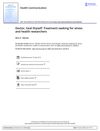 1 citations,
March 2016 in “Health Communication”
1 citations,
March 2016 in “Health Communication” Health experts should not ignore their own health issues and seeking treatment is important for their well-being and work.
 1 citations,
January 2008 in “Hair transplant forum international”
1 citations,
January 2008 in “Hair transplant forum international” The document could not be processed to provide a conclusion.
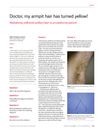
A 15-year-old boy's smelly, yellow armpit hair improved with clindamycin treatment.
 August 2018 in “Online journal of neurology and brain disorders”
August 2018 in “Online journal of neurology and brain disorders” Sodium valproate is effective in treating epilepsy, especially in patients who don't respond to other medications.
32 citations,
January 2006 in “Liver transplantation” Vitamin A toxicity can cause severe health issues and may require a liver transplant if other treatments fail.
 3 citations,
January 2015 in “Social Science Research Network”
3 citations,
January 2015 in “Social Science Research Network” The conclusion is that off-label drug use can lead to important medical discoveries and improve patient care.
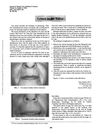 1 citations,
December 1996 in “Journal of Clinical Laser Medicine & Surgery”
1 citations,
December 1996 in “Journal of Clinical Laser Medicine & Surgery” A doctor describes a new, less expensive method for treating skin issues with a laser, and another doctor corrects a false claim about hair transplantation results.
 12 citations,
April 2022 in “Dermatology and therapy”
12 citations,
April 2022 in “Dermatology and therapy” Alopecia areata leads to significantly higher healthcare costs due to more doctor visits and prescriptions.
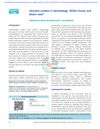 1 citations,
January 2014 in “Indian Journal of Dermatology, Venereology and Leprology”
1 citations,
January 2014 in “Indian Journal of Dermatology, Venereology and Leprology” The document concludes that clear communication and a strong doctor-patient relationship are essential for effective informed consent in dermatology.
October 2013 in “InTech eBooks” Successful outcomes depend on accurate diagnosis and strong doctor-patient relationships.
 2 citations,
January 2014 in “Journal of primary health care”
2 citations,
January 2014 in “Journal of primary health care” Most women with polycystic ovary syndrome were first diagnosed by their family doctor, who may need to record symptoms better and rely less on ultrasounds.
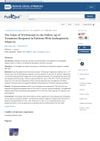
Trichoscopy is effective for tracking treatment progress in hair loss when used by an experienced doctor.
 55 citations,
July 2013 in “Dermatologic therapy”
55 citations,
July 2013 in “Dermatologic therapy” Some dermatological medications can impair male fertility, so consult a doctor before trying to conceive.
 43 citations,
March 2006 in “Seminars in Cutaneous Medicine and Surgery”
43 citations,
March 2006 in “Seminars in Cutaneous Medicine and Surgery” Different types of hair loss have unique features under a microscope, but a doctor's exam is important for accurate diagnosis.
 3 citations,
August 2017 in “PubMed”
3 citations,
August 2017 in “PubMed” A man got a scalp infection from synthetic hair implants because the procedure wasn't done by a doctor and was poorly managed.
 May 2017 in “Hair transplant forum international”
May 2017 in “Hair transplant forum international” To prevent infections after hair restoration surgery, keep the area clean and follow your doctor's care instructions.
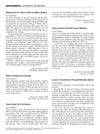 May 1999 in “Dermatologic Surgery”
May 1999 in “Dermatologic Surgery” Dr. Zitelli emphasized that "Mohs surgery" should only be called that when one doctor does both the surgery and pathology.
 January 2021 in “Reactions Weekly”
January 2021 in “Reactions Weekly” Man experienced lasting sexual issues and stress from finasteride, accused doctor of malpractice.
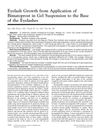 29 citations,
May 2010 in “Ophthalmology”
29 citations,
May 2010 in “Ophthalmology” Bimatoprost gel makes eyelashes grow longer, but may cause side effects and should be monitored by an eye doctor.
8 citations,
June 1982 in “Journal of adolescent health care” Teenage girls with Lupus often struggle with the disease's impact on their looks, which may lead them to change their medication without a doctor's advice.
 4 citations,
January 2021 in “Dermatologic Therapy”
4 citations,
January 2021 in “Dermatologic Therapy” AI is effective in diagnosing and treating hair disorders, including detecting hair loss and scalp conditions with high accuracy, but it should supplement, not replace, doctor-patient interactions.
 2 citations,
July 2018 in “Elsevier eBooks”
2 citations,
July 2018 in “Elsevier eBooks” Some supplements may help with hair loss, but there's not enough strong evidence to recommend them without doctor advice.
April 2023 in “Media Dermato Venereologica Indonesiana” COVID-19 reinfection may trigger alopecia areata.
August 2023 in “Jurnal kedokteran dan kesehatan/Jurnal Kedokteran dan Kesehatan” Medical students need better stress management and support to improve well-being and performance.
 108 citations,
November 2006 in “The Milbank Quarterly”
108 citations,
November 2006 in “The Milbank Quarterly” Drug advertising has greatly increased, changing consumer behavior and raising concerns about its influence on healthcare and patient protection.
 September 2022 in “Research Square (Research Square)”
September 2022 in “Research Square (Research Square)” The AI model DIET-AI effectively diagnoses skin diseases as well as doctors.
























